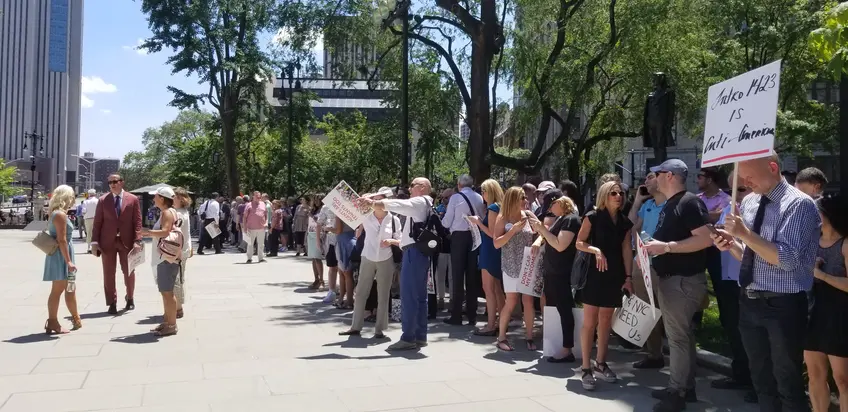 Rent law reform rally at City Hall. Credit: Vitali Ogorodnikov
Rent law reform rally at City Hall. Credit: Vitali Ogorodnikov
 Credit: Vitali Ogorodnikov
Credit: Vitali Ogorodnikov
In order to remedy the crisis, the New York State Senate, dominated by Democrats after a string of recent victories, is planning to pass a series of legislative measures. The City Council Housing and Buildings Committee describes the proposals as follows:
- Introduction 1423A would limit broker fees charged to renters to one month’s rent when the broker was hired by the landlord.
- Introduction 1424 would limit security deposits to one month’s rent.
- Introduction 1431A would require the return of security deposits within 14 days of the end of a lease.
- Introduction 1432 would require brokers to give an itemized explanation of how any application fee will be spent.
- Introduction 1433 would give tenants the option of paying a security deposit in six equal monthly installments.
As councilpersons convened with proponents and opponents at the City Hall chambers, Intro 1423 has proven to be a point of the hottest contention. Several hundred people, at one point estimated to be “around a thousand” by Council Member Cornegy during the session, have converged at City Hall.
 Credit: Vitali Ogorodnikov
Credit: Vitali Ogorodnikov
 Credit: Vitali Ogorodnikov
Credit: Vitali Ogorodnikov
Indoors, away from the blistering summer heat, most speakers echoed similar sentiments. Robert E. Cornegy, Jr., a NYC Council Member for the 36th District, mediated a civil yet impassioned dialogue between councilpersons, community organizations, and realtors.
The legislation proponents expressed varying degrees of support for the proposed measures. Representatives for the St. Nick’s Alliance and the Fifth Avenue Committee, two Brooklyn community groups, threw their full backing behind all measures, citing tenants’ growing struggles with rent payment, displacement, and predatory tactics employed by unsavory landlords.
By contrast, Mobilization for Justice, an advocacy group that lends legal help to those in financial need, supported only Intros 1424, 1432, and 1433, refusing to back the controversial Intro 1423. Notably, no one endorsed Intro 1423 directly, except as part of the “all-inclusive” approval.
As expected, the realtor panel focused almost exclusively on combating Intro 1423. The panelists emphasized that they wish to “look for solutions” to “make a better city,” yet cautioned that “good intentions may have unintended consequences,” where brokers, themselves grappling with a challenging field and financial struggles, are “in jeopardy of losing their homes.” Speakers drove home the fact that the policy would overwhelmingly affect small landlords, most of whom work full-time jobs to supplement their maintenance expenses, rather than the “big guys with big towers,” who already rely on in-house broker firms.
Inez Dickens, a longtime Council member and a licensed broker herself, reminisced on watching the combined forces of small-time brokers and local property owners gradually revive Harlem from a place of danger and desolation back into a functional community, where children are safe on the streets, and once-ample abandoned houses are back in full occupation.
Another oft-repeated argument was that tenants would ultimately face higher rents, where artificial fee caps would prompt landlords to pass expenses on to the residents via rent hikes whenever possible.
 Credit: Vitali Ogorodnikov
Credit: Vitali Ogorodnikov
As temperatures rose, so did tempers. Well before the official midday start of the rally, security personnel slowed the admission process into City Hall grounds to a trickle, stranding hundreds of protesters lined outside the fence for well over an hour. Many were admitted when the rally was officially over, and many more never made it inside at all.
Security officials reiterated that the restriction stems from City Hall being “at capacity,” yet this did not prevent mutters across the weary crowds that considered the action a deliberate measure to shut the public, which consisted mostly of realtors and their supporters, out of the dialogue.
 Credit: Vitali Ogorodnikov
Credit: Vitali Ogorodnikov
 Credit: Vitali Ogorodnikov
Credit: Vitali Ogorodnikov
 Credit: Vitali Ogorodnikov
Credit: Vitali Ogorodnikov
In either case, the vote upon the five measures remains up in the air. Today’s robust dialogue and impassioned public display were visceral reminders that city politics is a complex balancing act of trade-offs, where we must tread carefully lest we tip the scales too far in either direction.


 6sqft delivers the latest on real estate, architecture, and design, straight from New York City.
6sqft delivers the latest on real estate, architecture, and design, straight from New York City.
